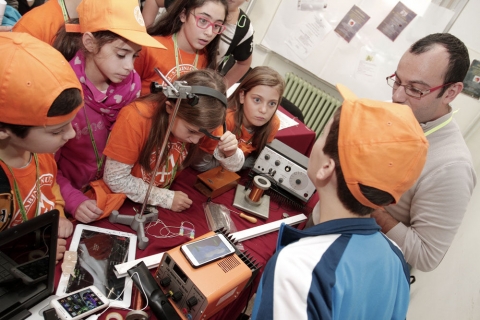
And a new logo and site for the eighth edition at www.gjc.it.
Education, Inclusion and Development
The Global Junior Challenge, currently in its eighth edition, is an international competition that employs new technology (Internet, Virtual Reality, Multimedia, etc.) for educating and training young men and women. Promoted by the City of Rome, the GJC, which is organized every two years by the Fondazione Mondo Digitale, is the conclusive event of a wide range of activities that promote the strategic role of new technology to share knowledge, drive intercultural cooperation and reduce the social divide to accelerate the successful achievement of sustainable development goals (SDGs).
The GJC is open to schools and universities, public and private institutions, cooperatives and social associations, enterprise and private citizens within various categories based on the age of the beneficiaries. An international jury will select the projects and proclaim the winners. The final event, which will be held in Rome on October 25-27, 2017, will include a showcase area, conferences, workshops and activities for students and professors.
Schools
Around the world, the general level of instruction is based on average pro capita income, national productivity and the responsible civic participation of citizens. Not only is “studying a tool for freedom” (Tullio De Mauro), but it is indispensable for societies and individuals to make free and responsible choices and contribute to community development. Schools, the privileged interlocutors of the GJC, compete for the dedicated “President of the Republic Award” for the most innovation project by Italian schools, while the “Tullio De Mauro Award” is reserved for a success story integrating educational quality and inclusion. In fact, a high-quality school is a school for everyone.
The GJC provides a unique opportunity to reflect on the educational challenges of the 21st century and the role of technology in social integration, development and the elimination of global poverty.
Categories
Admissible projects must be active as of December 31, 2016, and address young men and women up to age 29, who use ICT for educational objectives.
Projects are divided into four categories based on beneficiary age (up to 10 years old, up to 15, up to 16 and up to 29) and three other categories (Youth Access to Working World, Integration of Immigrants and Refugees, and Environmental Sustainability).
Awards
Four types of wards will be presented at GJC 2017:
The awards ceremony will be held on October 27, 2017 in the prestigious Sala Giulio Cesare at the Rome Campidoglio.
Young Digital Ambassadors Challenge
For the first time, the GJC will host five European delegations (Latvia, Italy, Spain, Sweden and United Kingdom) of young men and women aged 14-19. They are the digital ambassadors of Project Make Learn Share Europe, implemented as part of the European Erasmus+ Programme.
The final event will also host the #MLSE Working Conference in collaboration with Roma Capitale, Sheffield (United Kingdom), Riga (Latvia), Gijón (Spain) and the Knut Hahn School (Sweden).
Past Editions
Over the course of seven editions, the GJC has created a database of 3500 projects, 600 success cases and has assigned over 100 awards.